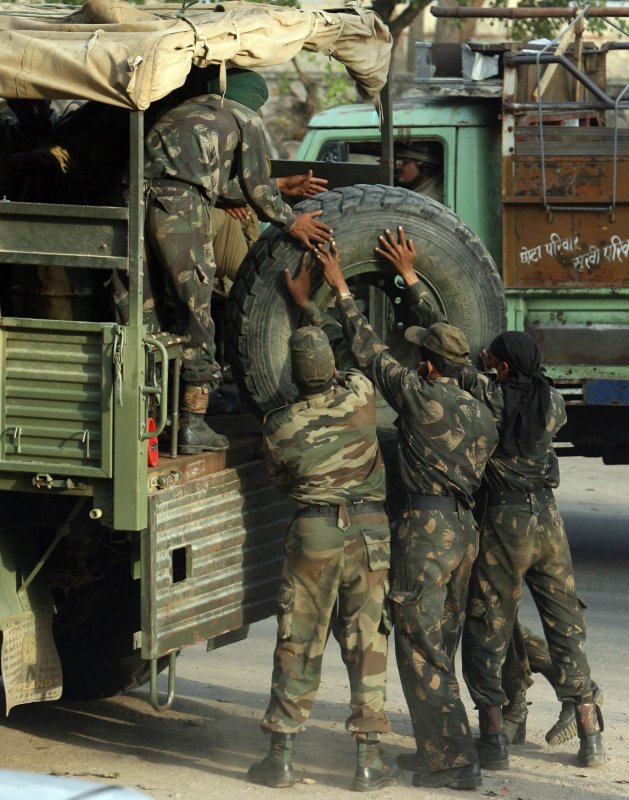Indian soldiers load a tire into their truck before heading to the sensitive areas at Dausa in India's desert state of Rajasthan. (UPI Photo) |
License Photo
NEW DELHI, Nov. 24 (UPI) -- India is readying two army divisions totaling more than 36,000 troops for deployment by March along a disputed northern border with China.
The divisions are to defend against a possible Chinese attack on India's state of Arunachal Pradesh. But China, which roundly condemns the move, has been claiming for more 50 years that the area is part of its autonomous Tibet region.
The intended deployment of India's 56th Army Division was announced in November last year and it will be based in the state of Nagaland, immediately southeast of Arunachal Pradesh. The intention is to guard against a Chinese attack through Myanmar, formerly called Burma.
The other new formation, the 71st Army Division, will be based in Assam, the second of two states that borders Arunachal Pradesh to the south.
Indian Defense Ministry officials said the two infantry mountain divisions will be fully "operational with specialized equipment" by 2011.
"The two divisions are now virtually in place, with officers and soldiers already being posted for them. They are in process of getting new equipment, which includes armored personnel carriers and light Howitzers," said an unnamed defense official.
Also, a new battalion of highly mobile and versatile paramilitary Arunachal Scouts and Sikkim Scouts will be up and running by May next year. "All the men in these formations will be drawn from mountain-fit local tribesmen but the officers will be from the army, at least for a while," a corps commander said.
But Chinese officials have called the deployment unproductive and it sends the wrong signals to Beijing.
India's announcement comes three weeks before Chinese Premier Wen Jiabao's official visit to India. His trip is to celebrate the 60th anniversary of the establishment of diplomatic relations between India and China, which became a communist state in 1949 after defeating of the governing nationalist forces of Chang Kai-shek.
China and India fought a brief border war in 1962 but Chinese troops pulled back into Tibet. Since then periodic talks have taken place to ease tensions in an attempt to resolve their dispute. India and China signed a Peace and Tranquility treaty in 1993 whereby both sides were to scale down their military strengths in the area.
But despite attempts at rapprochement over the territorial issue, a large military presence by both sides close to the frontier has been maintained to varying degrees.
"Since a war with China in 1962, the Indian army has set up a total of 10 mountain divisions in the region," Wang Dehua, a Chinese expert on India at the Shanghai International Studies Center said in an article in the state run Global Times newspaper.
"Such a move aims to add chips to the upcoming China-India talks on border disputes."
Wang said, "Those hawkish groups in New Delhi are getting above themselves after the U.S. voiced support for India's bid to become a permanent member of the U.N. Security Council."
Sun Shihai of the Asia Pacific studies at the Chinese Academy of Social Sciences said India's increase in troops in the region "showed its unwillingness to make a concession during the demarcation talks."
In October 2009, China strongly criticized a visit by Indian Prime Minister Manmohan Singh to Arunachal Pradesh, the first such high level visit to the state in a decade.
Chinese foreign ministry officials said Singh ignored Beijing's sensitivities over the disputed area.
The following month, China condemned a visit to the state by the Tibetan self-exiled spiritual leader the Dalai Lama. Since he fled Tibet in 1959 when Chinese troops marched into what was an independent country, Beijing has considered the Dalai Lama a political threat who foments separatist movements within Tibet.
Beijing's condemnation his visit was business as usual, said the Dalai Lama at the time.
"It is quite usual for China to step up the campaign against me wherever I go," he said after opening a museum at a 400-year-old monastery in Tawang, at the heart of the border row between the two countries. "My visit here is non-political."





